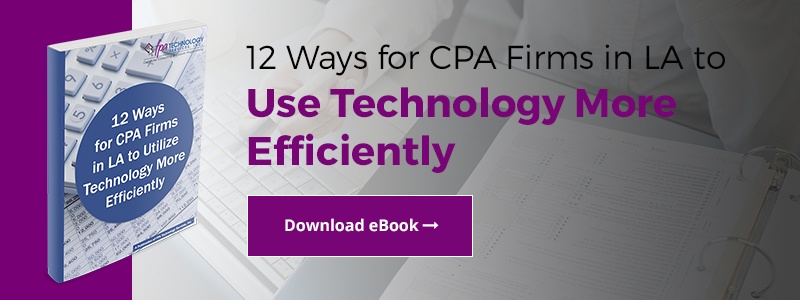A new era of data delivery and storage has been ushered in by growing Software-as-a-Service (SaaS) delivery platforms, or cloud-based systems. SaaS provides accounting firms, as well as other businesses, with accessibility and location flexibility and eliminates many of your firm’s responsibilities regarding technology maintenance.
Los Angeles based certified public accountant (CPA) firms are increasingly striving to achieve their goals of having paperless offices. However, for many firms, the paper hydra has not yet been slain.
Software as a Service
 There does not seem to be an easy, slam-dunk fit for a cost-effective move to the cloud for firms of any size that have a history of using traditional applications. That being said, using Software-as-a-Service applications can present opportunities to increase productivity, as well as to save time and money.
There does not seem to be an easy, slam-dunk fit for a cost-effective move to the cloud for firms of any size that have a history of using traditional applications. That being said, using Software-as-a-Service applications can present opportunities to increase productivity, as well as to save time and money.
Due to the private nature of the data that is entrusted to CPAs, the use of cloud applications has to be managed responsibly. The majority of risks that are inherent with SaaS applications do not relate to how they are stored by vendors or delivered online; rather, the risks relate to how the information is managed by the end user.
Data leakage often can occur within many firms and often are the result of disgruntled or careless employees. Mobile devices, such as tablets, smartphones and ultrabooks, can contain a great deal of information.
Security Policies
“The role that insiders play in the vulnerability of all sizes of corporations is massive and growing. In the 2016 Cyber Security Intelligence Index, IBM found that 60% of all attacks were carried out by insiders.”
Employee access rights and privileges are critical to control and require effective security policies and procedures — one such example is shutting down access immediately upon the termination of an employee. Many of the advantages of the cloud can become risks if not managed properly, including:
- Bring Your Own Device: If one of your employees is using a personal device, you need to ensure their access is limited to only their clients. If they leave your business, their access should be cut off immediately.
- Location Flexibility: Because data can be accessed from virtually anywhere via the cloud, it’s difficult to tell where an employee is located when they use their access. The sale of client data occurs more often than most company leaders recognize.
- Big Data and Analytics: Accountants today require tools that can help them to identify trends in company performance due to the sheer amount of information that is accumulated by businesses. Web-based Business Intelligence (BI) solutions like Domo, Qlik and Birst provide more useful insights than Excel or other traditional spreadsheet applications. These reporting applications can connect to a number of information repositories, including Customer Relationship Management (CRM) systems, third-party accounting applications, and SQL databases, providing real-time data no company performance in a concise format.
Web services provide insightful reporting by eliminating information silos and collecting data from disparate systems. Learning how to leverage these tools is vital for CPAs because these tools can help to make their daily functions easier. At the same time, it increases the requirements for securing the information that much more.
Working with an experienced and knowledgeable technology partner can ensure you position the value of adopting these solutions as a means to increase client value.
Another aspect of cloud computing that is sure to cross over into the accounting realm is utility-based or usage-based pricing. Through this function, clients are able to log many expenses by capturing receipts on smart phones, recording sales, and sing web-based invoicing solutions.
Accounting Apps
In many ways, bookkeeping activities are being made easier for small businesses and are being prepared in increasingly cohesive ways via SaaS technology. Accounting records, such as sales and purchases, can be entered into SaaS-based accounting applications and then sent as a packaged file to an accountant for further processing.
Accounting technology tends to serve as the core of the application suites available today — from small and medium-sized businesses using tools like QuickBooks Online to larger organizations using solutions like NetSuite, Oracle, and SAP.
Risk management, technology integration and security remain top priorities for accounting firms and other businesses, and understanding what solutions are available to address these concerns is crucial to a growing organization.
We’ve put together a helpful free resource guide “12 Ways for CPA Firms in LA to Utilize Technology More Efficiently” that you can download to help you follow through on the aforementioned tips.
/fpa-logo-tagline.gif)






